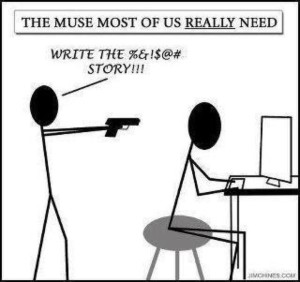I often find it funny how much time is spent talking about “balance” in the writing life, and how often that equates to finding time to write. Me, I actually have the opposite problem. I don’t have much in the way of a social life. My family expectations are minimal and my day job hardly impinges on my off time. I only do the dishes or clean my house when I absolutely can’t stand the mess anymore. I’ve got time to kill. I’m an obsessive when it comes to stories.
Raise your hand if you have a tendency to become enamored with something (an idea, a story, your own personal real life macguffin) that is so completely awesome that you eat, sleep and breath it. You’re friends get tired of hearing about it. You’re distracted at the day job, lose focus in conversations, and are generally lost in the niftiness of your new “thing” that it pretty much takes over your brain.
I know I’m not the only one this happens with. As writers, I think just about all of us have that period when we absolutely fall in love with something to the point that we want to delve deep and write about it. The issue for me comes when 1) I can’t let go of the idea until I get so completely sick of it I can’t bear the thought of going near the thing, 2) while I’m in the throws of my obsession even talking to people can be irksome and I start entertaining scenarios in my head where I thwart my antagonist with something heavy and suitably cathartic, and 3) nothing else gets done…at all.
Now, while I’m in no real danger of going postal on some bystander who innocently asks me a question while my concentration is attempting to focus on my current obsession, the first and third issues stated above can be something of a problem.
Like I said, I think all writers have the eureka moment when they find a truly cool idea for a story and dive right in. That’s great when it happens. I love those bursts of writing frenzy when I just have to get it all down. But, inevitably, the burst will end. When this happens with me it’s incredibly difficult to get back into that story idea. I start floundering around until I get so frustrated that I give up on it. Not good.
The other issue with this particular scenario is when I obsess about things that I will never…ever…write about. I’m a habitual daydreamer, and most of my daydreams, while vastly entertaining to me, would not a novel or short story make. And like in the story idea, I can’t let go of it until it’s run its course, which could be days or weeks. Days or weeks when little or no effective writing is being done.
What have I learned from this happening again and again? Mainly that those writing ideas that I get so excited about are usually not the ones I finish. It’s the stories I make myself sit down to write, without the obsession driving me, that I stick with. The obsessions I can sometimes go back to after a long break, but it’s rare. As for the non-writing obsessions? I’ve started using those as writing exercises. They take me places that my normal writing practices don’t, so even if I never use them in a book, I’m still writing–still practicing the craft while I lose myself in a fancy.
As for the last issue, where nothing else ever gets done…well, with all the focus on trying to avoid distractions and finding time to write, I start to wonder if this is an actual problem or not? Perhaps this is just the inevitable conclusion to ignoring the distractions. The TV will go unwatched, the dishes unwashed, that cat’s litter box un…okay, maybe that’s not a chore anyone wants to skip, but my point is that there are only so many hours in the day. If you want to make time for one thing, something else will most likely go unattended. I feel guilty about dusty shelves and laundry splayed over the bedroom floor like a teenager on summer break. I’m an adult, I should have learned by now to make my bed in the morning, but in reality, should I be balancing out my day by doing these chores or is it okay to get it and let myself feel free to rampage through fantasy land?
What it comes down to is what exactly “balance” is to each of us. Is it catching that movie with your family rather than writing or indulging a new obsession with a story idea rather than gossiping with coworkers at the day job? Is it getting in a certain number of hours writing vs a certain list of chores in a day?
It is in the end about priorities. What is truly important, and what are you willing to sacrifice to make it happen? I am aware that my tendency for obsessing is excessive, but to be honest, I don’t think I can turn it off. And I’m not really sure if I would want to. I mean, really, why would I want to sacrifice the stories in my head for the humdrum of every day? To me, stories, whether they be written down for others to read or kept securely locked in my head, are where my bliss is. Perhaps that’s the “balance” that keeps me sane and happy. Maybe that’s all right and I should just accept that about myself. Or maybe I’m just crazy, in which case acceptance is probably a symptom of the insanity and it doesn’t really matter in the end. I don’t know, but I’m going to enjoy it either way, housework be damned.


